I am new to JavaScript promises. I am trying the following code:
async function handlePromises() {
var promise1 = new Promise((resolve, reject) => {
console.log(`Creating promise1 object at ${new Date(Date.now()).toISOString()}`);
setTimeout(() => {
resolve(`Promise 1 resolved after 10 seconds at ${new Date(Date.now()).toISOString()}`);
}, 10000);
});
let promise2 = new Promise((resolve, reject) => {
console.log(`Creating promise2 object at ${new Date(Date.now()).toISOString()}`);
setTimeout(() => {
resolve(`Promise 2 resolved after 5 seconds at ${new Date(Date.now()).toISOString()}`);
}, 5000);
});
let promise3 = new Promise((resolve, reject) => {
console.log(`Creating promise3 object at ${new Date(Date.now()).toISOString()}`);
setTimeout(() => {
resolve(`Promise 3 resolved after 3 seconds at ${new Date(Date.now()).toISOString()}`);
}, 3000);
});
let promise4 = new Promise((resolve, reject) => {
console.log(`Creating promise4 object at ${new Date(Date.now()).toISOString()}`);
setTimeout(() => {
resolve(`Promise 4 resolved after 4 seconds at ${new Date(Date.now()).toISOString()}`);
}, 4000);
});
return Promise.all([promise1, promise2, promise3, promise4]);
}
handlePromises();Now I am trying to call the above function from the call of the following function:
async function handlePromisesUsingAsync() {
let getPromisesArray = handlePromises();
getPromisesArray.then((value) => console.log(value));
}
This call prints the output as expected :
But when I change the handlePromisesUsingAsync method definition to the following code(notice the addition of await keyword):
async function handlePromisesUsingAsync() {
let getPromisesArray = await handlePromises();
getPromisesArray.then((value) => console.log(value));
}
I get the following error:
Why is this so? Isn't the SAME function returning the SAME fulfilled Promise in both the calls?

